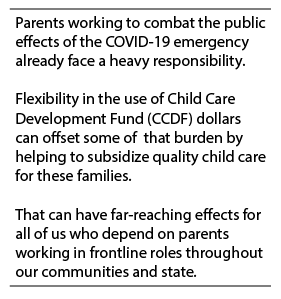Across our state, health care providers, first responders and other frontline personnel are putting themselves and their families at risk in their efforts to mitigate the COVID-19 pandemic in our neighborhoods and communities. This heroic work is made possible by yet another, frequently unrecognized group of essential personnel—Nebraska’s child care professionals. These individuals carry the responsibility not only of caring for their own families, but also for the loved ones of working parents who are needed to keep our state functioning during the ongoing emergency. Nebraska’s broader response to the COVID-19 pandemic must therefore account for different types of scenarios involving the status of child care providers throughout the state.
 Scenario 1: Child cares remain open with restrictions
Scenario 1: Child cares remain open with restrictions
Currently in Nebraska, child care providers have the option to remain open with certain limitations in place. So long as this situation exists, it should be a statewide priority to connect working parents in frontline roles with providers in their communities. However, as parents remove their children from child care during this emergency, providers are struggling to stay afloat financially. The faster we can connect working parents in these roles with providers, the more likely we will be to keep available slots open for the families who need them most urgently.
Happily, there are efforts underway to build these connections between parents and providers through emergency resource and referral services.
Even so, we must also acknowledge the fact that many working parents in frontline jobs already struggle with the costs of child care. Policymakers should explore the option to use Child Care Development Fund (CCDF) dollars to help offset the expense for these families. This would both enable parents to secure the coverage they need to fulfill their professional responsibilities and provide greater financial stability for the providers themselves.
- In-home care for prioritized essential personnel: A central challenge involving child care for frontline personnel involves the increased risk of spreading the infection because of the nature of the parents’ jobs. One way to address this challenge would be to use qualified caregivers to deliver child care services within the family home itself. This solution could be subsidized in part through CCDF dollars. Naturally, this approach would involve greater expense in the short term. However, those expenses could be offset in the long run by limiting the spread of the virus and lower the associated costs of health care.
- Recruiting licensed child care programs for emergency care: In the event of a general closure of child care programs, state authorities could encourage and authorize selected high-quality programs to voluntarily reopen specifically to provide services for children of frontline personnel. In effect, this would create a temporary class of emergency licensed child care. Because these programs already have access to the required facilities and on-staff expertise, they would be well positioned to respond quickly and efficiently to the needs of local employers and workers for emergency child care services. Again, CCDF funds could be used to absorb the costs of this kind of solution.
- Temporary alternative child care: On March 26, 2020, Governor Ricketts issued Executive Order 20-08, loosening licensing requirements to allow child care services to be delivered for essential workers in non-residential locations operated by hospitals, schools, nonprofit and faith-based organizations. In the event that employers pursue this option, it is crucial for the well-being of children that these services are appropriate and well-managed by qualified early childhood professionals.


